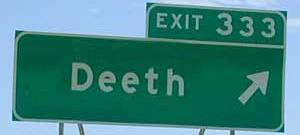Well, we know who the Republican presidential nominee is going to be. And despite talk of flipping hundreds of superdelegates or massive landslides in the final states - note that all Democratic delegate contests are proportional - we know who the Democratic nominee is going to be.
So the general election starts now, right? Well, not quite.
The Sanders campaign wants to continue the campaign to "the end." Understandable, especially since Hillary Clinton herself campaigned to the last state in 2008, despite daunting delegate math. But we're close enough to the end to start defining the end.
On Tuesday night after his Indiana win, Sanders was talking about "the
convention." Now, contesting the convention can mean a couple different
things. It can mean a tooth and nail fight, like Republicans were
anticipating just a week ago. Or it can mean the symbolism of the
platform and the roll call; people putting their votes on the record,
but in the context of knowing and acknowledging in advance who will be
the nominee.
The question of superdelegates is in the air, indeed was the most contentious conversation at out own Iowa 2nd CD convention Saturday. It's questioned enough that I think many people believe that Clinton is BEHIND in pledged delegates, and only in the lead because of superdelegates. That's part of a trap that some Sanders supporters have fallen into that I see many campaigns of all ideological stripes fall into: the Everyone I Know Voted For Bernie trap. In fairness, a room of 60something Southern black women might say Everyone I Know Voted For Hillary. This is all exacerbated by a near-direct relationship between age and support; older you are, more likely you're for Hillary, younger you are, more likely you're for Bernie.
In fact, by all counts and estimates, Hillary is ahead of Bernie on the PLEDGED delegate count. AP is reporting 1683-1362. Close but clear.
The superdelegates are another matter - Clinton has an overwhelming 522 to 39 lead. There's a lot of reasons for that, but I'm not going to characterize them because above all I want this post to be about unity. Obviously that's a lot sharper lead than the pledged delegate lead... but Hillary is leading in both. The superdelegates magnify the majority but don't create it.
I don't believe in changing the rules in the middle of the game, but I'm always open to ideas next time. Superdelegates and other nomination reforms are a reasonable subject for discussion. Team Bernie has drawn a line in the sand that Superdelegates Are Bad so at least for unity's sake it needs to be on the table along with the issues of open vs. closed primaries. (That one is harder, because by and large election law is STATE law.) Just because of the time frame, that may be limited to TALKING about talking about it. By its very nature, process stuff usually happens in off years rather than election years.
(The biggest such question affecting Iowans will be whether President Hillary tells the DNC no caucuses, primaries only, which I expect. The Iowa Democratic Party clearly has no Plan B for fighting for an early primary in that scenario, but as I'm not on the caucus review committee, I don't have a seat at that table so I'm just saying so in public.)
Sanders himself yesterday said "until the last vote is cast" which would mean the DC primary June 14. Personally I'd rather see things wrap up after California and New Jersey on June 7, but June 14 is better than the convention roll call. There are offices to open, doors to knock and lit to print, and frankly the H-> is going to have to be on it.
Others on Team Bernie are arguing he should compete until the nomination is mathematically clinched, and here the math gets convoluted.
Numbers
can shift by one or two but I'm finding a total of 4766 delegates; 4051
pledged and 715 superdelegates. That makes the total needed for
nomination 2383.
There's an argument that somehow
only pledged delegates are "legitimate" and that Sanders should not
concede until Clinton has a majority of pledged delegates.
Half of the 4051 pledged delegates is 2026. Hillary is likely to pass that number of pledged delegates on June 7.
Numbers
can shift by one or two but I'm finding a total of 4766 delegates; 4051
pledged and 715 superdelegates. That makes the total needed for
nomination 2383.
There's an argument that somehow
only pledged delegates are "legitimate" and that Sanders should not
concede until Clinton has a majority of pledged delegates.
Half of the 4051 pledged delegates is 2026. Hillary is likely to pass that number of pledged delegates on June 7.
But
if you're arguing that she has to get 2383 delegates solely out of the
4051 pledged delegates, without counting the superdelegates, then you're
counting superdelegates AGAINST her (by using them to measure the bar of what constitutes a majority) but not FOR
her (by letting them "count" in an argumentative sense which of course
they actually do in a roll call sense.)
So you're
arguing that the real threshold for nomination is not 2383/4766 (50%),
or 2026/4051 (50%) its 2383/4051 or 58.8%. That's an unfair standard.
Either argue for 2383/4766 or for 2026/4051. Either superdelegates "count" or they don't.

No comments:
Post a Comment